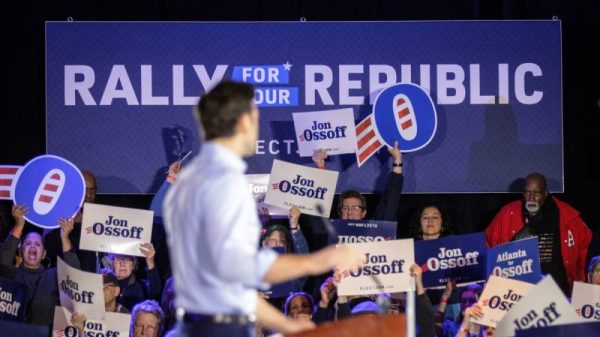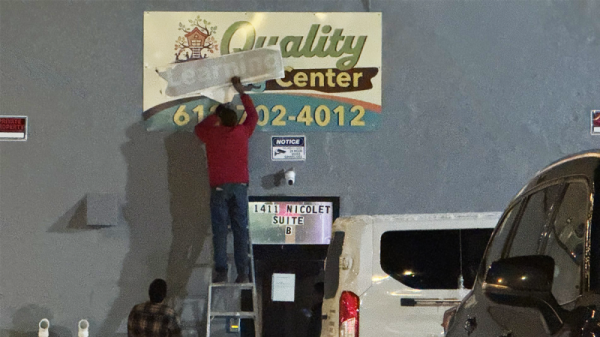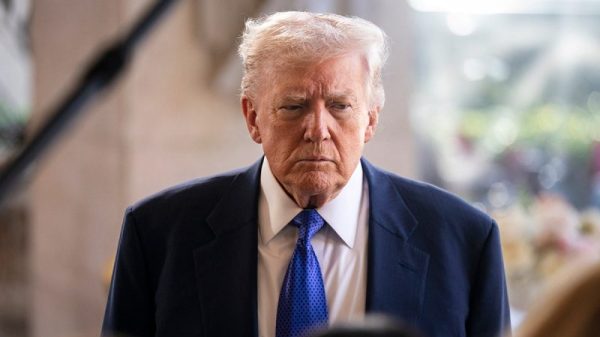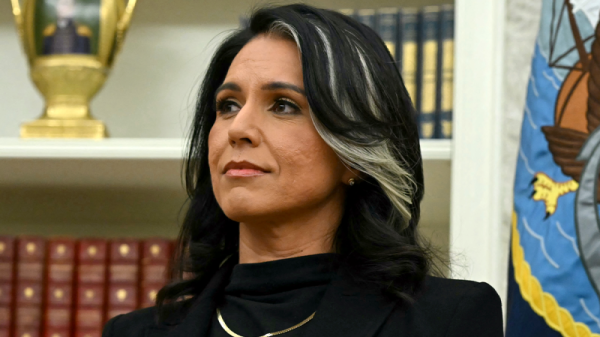Supreme Court Justice Clarence Thomas reported three 2022 trips on the private jet of a Texas billionaire in a financial disclosure form released Thursday, and for the first time detailed the businessman’s purchase of three properties from the justice’s family years earlier.
In his required annual report, Thomas said one of the trips on the private plane of his friend and benefactor, Harlan Crow, was recommended by his security detail. The justices faced heightened security risks, Thomas noted, after the May 2022 leak of the court’s majority opinion to eliminate the nationwide right to abortion and overturn Roe v. Wade.
Thomas, a justice since 1991, acknowledged and corrected mistakes and omissions in past reports that involved bank accounts, a life insurance policy and the name of his wife’s real estate company. He also defended his decision to omit private jet travel from his reports in recent years, even though he previously disclosed at least one similar personal trip with Crow in a report from the 1990s.
The 2022 filings from Thomas and Justice Samuel A. Alito Jr. were made public Thursday, months later than those of their colleagues at the high court, because the two justices had requested 90-day extensions. The annual reports have drawn increased attention amid pressure from congressional Democrats and outside legal experts for the justices to strengthen disclosure requirements for travel and gifts and adopt specific ethics guidelines.
The pressure comes in part from news reports by ProPublica and other outlets revealing that Thomas did not disclose years of luxury vacations and private jet travel funded by Crow, an influential Republican donor, and that Alito did not report a free trip to a fishing resort in Alaska in 2008. Alito flew to the resort on the private jet of a billionaire hedge fund manager who later had cases before the court; that trip was organized by conservative judicial activist Leonard Leo, who had helped Alito win confirmation, according to ProPublica.
Thomas and Alito have said they did not believe they needed to disclose the free travel. But ethics rules for federal judges and the nine justices, which were revised in March, made clear that starting with the 2022 forms, judges and justices must report trips by private jet. The changes were designed to require a fuller accounting of the free trips and other gifts members of the judiciary accept, clarifying which gifts can be counted as “personal hospitality” from a close friend and exempt from disclosure.
Thomas’s report says he was advised by colleagues and court officers “early in his tenure” that he did not need to report private jet travel when it fell under the personal hospitality exemption. However in 1998, seven years after he was confirmed to the high court, Thomas reported traveling on Crow’s personal plane the prior year to Bohemian Grove, an exclusive all-male retreat in California. He described Crow as a “personal friend,” according to the disclosure form, one of several from the 1990s that is no longer publicly available but was provided to The Washington Post by watchdog organizations Common Cause and Documented.
In his 2000 disclosure, Thomas reported traveling on a private plane in 1999 to the Daytona 500, where he served as grand marshal and received a commemorative jacket worth $800.
The report released Thursday says Thomas sought guidance in preparing it from the Supreme Court’s legal office, the counselor to Chief Justice John G. Roberts Jr., staff of the Judicial Conference’s financial disclosure committee and an attorney. Thomas said he “continues to work with Supreme Court officials and the Committee staff for guidance on whether he should further amend his reports from any prior years.”
Thomas’s lawyer, Elliot S. Berke, said in a statement that the justice also worked with an accountant to comply with the updated disclosure rules and review past reports for errors. Berke pushed back on criticism of the justice’s alleged ethical violations, saying it was driven by liberal groups and lawmakers opposed to Thomas’s legal philosophy.
“After reviewing Justice Thomas’s records, I am confident there has been no willful ethics transgression, and any prior reporting errors were strictly inadvertent,” Berke said.
Federal ethics law requires top officials from all branches of government, including the justices, to file annual disclosures listing investments, gifts, outside income and the source of spousal income so that the public can assess potential conflicts of interest. Officials from the legislative and executive branch also have more stringent requirements.
The Senate Judiciary Committee advanced legislation in July that would require the justices to follow disclosure rules as strict as those that apply to members of Congress — including more detailed and timely information about privately sponsored travel, for example. The bill, which is opposed by Republicans and unlikely to succeed, would also tighten recusal requirements for the justices and create an ethics code for the high court.
In response to complaints from Democratic lawmakers, a committee of the federal judiciary’s policymaking body was tasked with reviewing Thomas’s previous decision not to disclose his dealings with Crow.
“That matter is under review” by the committee, Jackie Koszczuk, a spokeswoman for the Administrative Office of the U.S. Courts, said Thursday.
Roberts has opposed congressional efforts to impose more stringent rules. He said this spring that the court was continuing to “look at things” to show the American public that the court adheres to the “highest standards of conduct.” The justices say they consult a set of ethics principles to guide their decisions on recusals and other matters. However, they have struggled to reach consensus on a binding ethics policy.
The Administrative Office of the U.S. Courts released reports for the other Supreme Court justices in June, detailing their outside teaching income, book payments and travel to legal conferences. In his 2022 report, Alito disclosed earning $29,250 from teaching at Regent University and Duke University law schools. Alito also reported that the University of Notre Dame’s law school provided him with transportation, lodging and meals for a five-day trip to Rome in July for the school’s religious liberty summit.
During that trip, Alito made his first public comments following the decision he wrote overturning Roe v. Wade. The justice responded sarcastically to criticism of his opinion from foreign officials, including Britain’s Prince Harry.
Thomas listed a three-day trip last February to Texas to speak at an American Enterprise Institute conference, and said he only “flew private” on the return trip because of an unexpected ice storm that disrupted the event.
Thomas also took Crow’s plane to return to Dallas in May for the rescheduled AEI conference, which was held on a business campus Crow owns. For that trip, shortly after the unprecedented leak of a draft version of the abortion decision, the justice wrote that he was following the advice of his security detail that “recommended noncommercial travel whenever possible.”
The justice discussed the breach of the court’s secrecy protocols in his remarks at the conference, saying the leak had turned the Supreme Court into a place “where you look over your shoulder,” and may have irreparably shattered trust in the institution.
For weeks after the draft was revealed by Politico, people gathered outside the homes of the court’s conservative justices to protest the loss of abortion rights. A California man was arrested and charged in an alleged attempt to kill Justice Brett M. Kavanaugh, who was in the majority to overturn Roe. The court’s building itself was surrounded by a high, black fence to discourage potential violence. For the upcoming budget year, the Supreme Court has asked Congress for an additional $10 million for physical security and other protective activities, including risk assessments.
Gabe Roth, who leads the court transparency group Fix the Court, said “everyone is concerned with the justices’ security.” But he said there is no reason that the nine members of the court cannot safely travel on commercial flights with protection from the U.S. Marshals.
Roth called the suggestion that the justices need the additional buffer of private planes “preposterous.”
“We’re going to have to buy Air Force Three through Eleven for the nine justices?” he quipped, a reference to the Air Force One and Air Force Two military jets that transport the U.S. president and vice president. “I don’t think that’s something the taxpayers want to fund.”
In July, Thomas reported taking a six-day trip to the Adirondacks. Crow paid for the justice’s flight by private plane, as well as meals and lodging at his luxury resort, the report said.
Thomas reported that he had omitted an unspecified number of personal bank accounts from his report for several years, from 2017 to 2021, because he had misinterpreted the rules and thought they were exempt from disclosure. The accounts with Congressional Federal Credit Union held between $100,001 and $250,000 in cash at the end of 2022, he reported.
He also said he had previously inadvertently failed to disclose a life insurance policy owned by his wife, conservative activist Virginia “Ginni” Thomas. As in past years, she received a salary and benefits from her firm Liberty Consulting, according to the disclosure.
Thomas’s filing also provided new details about the 2014 sale to Crow of three properties in Savannah, Ga., that belong to the justice’s family, including the home where Thomas’s mother was living and two nearby vacant lots. Experts previously said the $133,363 real estate transaction, first reported by ProPublica, should have been disclosed when it happened. Thomas wrote Thursday that the property deal resulted in a loss because of improvements he had made to his mother’s home, and that he did not realize he needed to report a sale that did not result in a profit.
Crow has defended his friendship with Thomas, and said he bought the property to preserve as a possible museum dedicated to the justice’s life and work. Earlier this year, Crow did not respond to ProPublica’s questions about whether Thomas’s mother was paying rent. But Thomas’s lawyer said in the statement Thursday that she is not: “As part of the overall agreement and consistent with his past practice, Mr. Crow provided a life estate to Mrs. Williams, Justice Thomas’s mother, to live in this home for the rest of her life without rent.”
Shawn Boburg and Jonathan O’Connell contributed to this report.
Supreme Court Justice Clarence Thomas reported three 2022 trips on the private jet of a Texas billionaire in a financial disclosure form released Thursday, and for the first time detailed the businessman’s purchase of three properties from the justice’s family years earlier.
In his required annual report, Thomas said one of the trips on the private plane of his friend and benefactor, Harlan Crow, was recommended by his security detail. The justices faced heightened security risks, Thomas noted, after the May 2022 leak of the court’s majority opinion to eliminate the nationwide right to abortion and overturn Roe v. Wade.
Thomas, a justice since 1991, acknowledged and corrected mistakes and omissions in past reports that involved bank accounts, a life insurance policy and the name of his wife’s real estate company. He also defended his decision to omit private jet travel from his reports in recent years, even though he previously disclosed at least one similar personal trip with Crow in a report from the 1990s.
The 2022 filings from Thomas and Justice Samuel A. Alito Jr. were made public Thursday, months later than those of their colleagues at the high court, because the two justices had requested 90-day extensions. The annual reports have drawn increased attention amid pressure from congressional Democrats and outside legal experts for the justices to strengthen disclosure requirements for travel and gifts and adopt specific ethics guidelines.
The pressure comes in part from news reports by ProPublica and other outlets revealing that Thomas did not disclose years of luxury vacations and private jet travel funded by Crow, an influential Republican donor, and that Alito did not report a free trip to a fishing resort in Alaska in 2008. Alito flew to the resort on the private jet of a billionaire hedge fund manager who later had cases before the court; that trip was organized by conservative judicial activist Leonard Leo, who had helped Alito win confirmation, according to ProPublica.
Thomas and Alito have said they did not believe they needed to disclose the free travel. But ethics rules for federal judges and the nine justices, which were revised in March, made clear that starting with the 2022 forms, judges and justices must report trips by private jet. The changes were designed to require a fuller accounting of the free trips and other gifts members of the judiciary accept, clarifying which gifts can be counted as “personal hospitality” from a close friend and exempt from disclosure.
Thomas’s report says he was advised by colleagues and court officers “early in his tenure” that he did not need to report private jet travel when it fell under the personal hospitality exemption. However in 1998, seven years after he was confirmed to the high court, Thomas reported traveling on Crow’s personal plane the prior year to Bohemian Grove, an exclusive all-male retreat in California. He described Crow as a “personal friend,” according to the disclosure form, one of several from the 1990s that is no longer publicly available but was provided to The Washington Post by watchdog organizations Common Cause and Documented.
In his 2000 disclosure, Thomas reported traveling on a private plane in 1999 to the Daytona 500, where he served as grand marshal and received a commemorative jacket worth $800.
The report released Thursday says Thomas sought guidance in preparing it from the Supreme Court’s legal office, the counselor to Chief Justice John G. Roberts Jr., staff of the Judicial Conference’s financial disclosure committee and an attorney. Thomas said he “continues to work with Supreme Court officials and the Committee staff for guidance on whether he should further amend his reports from any prior years.”
Thomas’s lawyer, Elliot S. Berke, said in a statement that the justice also worked with an accountant to comply with the updated disclosure rules and review past reports for errors. Berke pushed back on criticism of the justice’s alleged ethical violations, saying it was driven by liberal groups and lawmakers opposed to Thomas’s legal philosophy.
“After reviewing Justice Thomas’s records, I am confident there has been no willful ethics transgression, and any prior reporting errors were strictly inadvertent,” Berke said.
Federal ethics law requires top officials from all branches of government, including the justices, to file annual disclosures listing investments, gifts, outside income and the source of spousal income so that the public can assess potential conflicts of interest. Officials from the legislative and executive branch also have more stringent requirements.
The Senate Judiciary Committee advanced legislation in July that would require the justices to follow disclosure rules as strict as those that apply to members of Congress — including more detailed and timely information about privately sponsored travel, for example. The bill, which is opposed by Republicans and unlikely to succeed, would also tighten recusal requirements for the justices and create an ethics code for the high court.
In response to complaints from Democratic lawmakers, a committee of the federal judiciary’s policymaking body was tasked with reviewing Thomas’s previous decision not to disclose his dealings with Crow.
“That matter is under review” by the committee, Jackie Koszczuk, a spokeswoman for the Administrative Office of the U.S. Courts, said Thursday.
Roberts has opposed congressional efforts to impose more stringent rules. He said this spring that the court was continuing to “look at things” to show the American public that the court adheres to the “highest standards of conduct.” The justices say they consult a set of ethics principles to guide their decisions on recusals and other matters. However, they have struggled to reach consensus on a binding ethics policy.
The Administrative Office of the U.S. Courts released reports for the other Supreme Court justices in June, detailing their outside teaching income, book payments and travel to legal conferences. In his 2022 report, Alito disclosed earning $29,250 from teaching at Regent University and Duke University law schools. Alito also reported that the University of Notre Dame’s law school provided him with transportation, lodging and meals for a five-day trip to Rome in July for the school’s religious liberty summit.
During that trip, Alito made his first public comments following the decision he wrote overturning Roe v. Wade. The justice responded sarcastically to criticism of his opinion from foreign officials, including Britain’s Prince Harry.
Thomas listed a three-day trip last February to Texas to speak at an American Enterprise Institute conference, and said he only “flew private” on the return trip because of an unexpected ice storm that disrupted the event.
Thomas also took Crow’s plane to return to Dallas in May for the rescheduled AEI conference, which was held on a business campus Crow owns. For that trip, shortly after the unprecedented leak of a draft version of the abortion decision, the justice wrote that he was following the advice of his security detail that “recommended noncommercial travel whenever possible.”
The justice discussed the breach of the court’s secrecy protocols in his remarks at the conference, saying the leak had turned the Supreme Court into a place “where you look over your shoulder,” and may have irreparably shattered trust in the institution.
For weeks after the draft was revealed by Politico, people gathered outside the homes of the court’s conservative justices to protest the loss of abortion rights. A California man was arrested and charged in an alleged attempt to kill Justice Brett M. Kavanaugh, who was in the majority to overturn Roe. The court’s building itself was surrounded by a high, black fence to discourage potential violence. For the upcoming budget year, the Supreme Court has asked Congress for an additional $10 million for physical security and other protective activities, including risk assessments.
Gabe Roth, who leads the court transparency group Fix the Court, said “everyone is concerned with the justices’ security.” But he said there is no reason that the nine members of the court cannot safely travel on commercial flights with protection from the U.S. Marshals.
Roth called the suggestion that the justices need the additional buffer of private planes “preposterous.”
“We’re going to have to buy Air Force Three through Eleven for the nine justices?” he quipped, a reference to the Air Force One and Air Force Two military jets that transport the U.S. president and vice president. “I don’t think that’s something the taxpayers want to fund.”
In July, Thomas reported taking a six-day trip to the Adirondacks. Crow paid for the justice’s flight by private plane, as well as meals and lodging at his luxury resort, the report said.
Thomas reported that he had omitted an unspecified number of personal bank accounts from his report for several years, from 2017 to 2021, because he had misinterpreted the rules and thought they were exempt from disclosure. The accounts with Congressional Federal Credit Union held between $100,001 and $250,000 in cash at the end of 2022, he reported.
He also said he had previously inadvertently failed to disclose a life insurance policy owned by his wife, conservative activist Virginia “Ginni” Thomas. As in past years, she received a salary and benefits from her firm Liberty Consulting, according to the disclosure.
Thomas’s filing also provided new details about the 2014 sale to Crow of three properties in Savannah, Ga., that belong to the justice’s family, including the home where Thomas’s mother was living and two nearby vacant lots. Experts previously said the $133,363 real estate transaction, first reported by ProPublica, should have been disclosed when it happened. Thomas wrote Thursday that the property deal resulted in a loss because of improvements he had made to his mother’s home, and that he did not realize he needed to report a sale that did not result in a profit.
Crow has defended his friendship with Thomas, and said he bought the property to preserve as a possible museum dedicated to the justice’s life and work. Earlier this year, Crow did not respond to ProPublica’s questions about whether Thomas’s mother was paying rent. But Thomas’s lawyer said in the statement Thursday that she is not: “As part of the overall agreement and consistent with his past practice, Mr. Crow provided a life estate to Mrs. Williams, Justice Thomas’s mother, to live in this home for the rest of her life without rent.”
Shawn Boburg and Jonathan O’Connell contributed to this report.





















